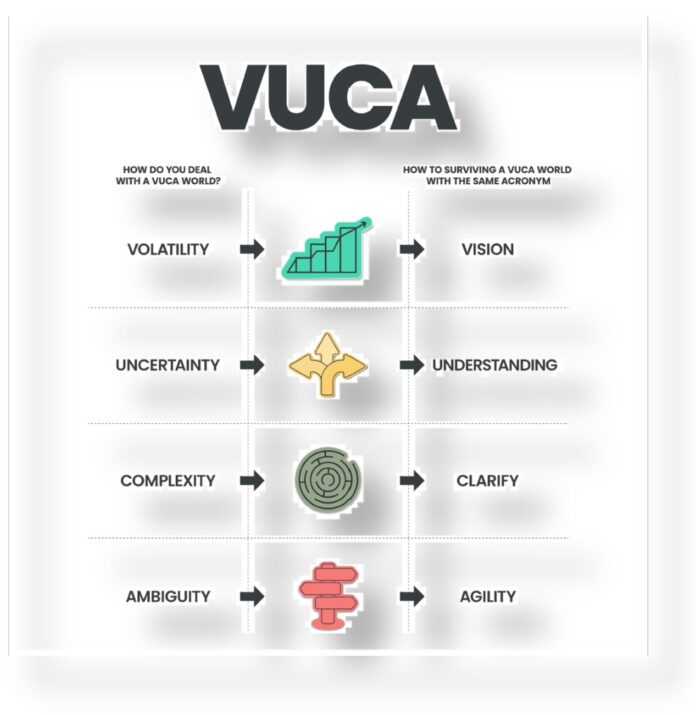Embracing Uncertainty
The Power of Ambiguity Tolerance in a Turbulent World
Increasingly shaped by complexity and unpredictability, the world in which we inhabit becomes a challenge to challenge our collective ability to tolerate ambiguity. I would even venture to state that tolerance has emerged as an indispensable skill for leaders addressing global challenges. So-called Climate change, geopolitical instability, and pandemics (real or planned) demand solutions that transcend borders, ideologies, and traditional frameworks. Yet, these challenges often lack clear answers, definitive data, or predictable outcomes. The question then becomes: how do we lead effectively in a world where ambiguity is the only constant?
The Nature of Ambiguity in Global Challenges
Ambiguity tolerance is the capacity to stay composed and make decisions in the face of uncertainty, competing perspectives, and incomplete information. Nowhere is this skill more critical than in addressing global and environmental issues.
This much debated belief system known as Climate change presents a web of interconnected problems—rising sea levels, extreme weather, and shifting ecosystems—and they state defy simple solutions. Conversely, other opinions by just as vocal scientists claim it is nothing more than a fabrication of the truth to support a one world order. It’s a fact that climate changes, as we have lived through mini-ice ages, draughts, and other severe weather.
Similarly, pandemics (many say Planned-demics) like COVID-19 have highlighted the difficulty of making timely, informed decisions with limited data and ever-evolving variables. Contradictory “follow the science” narratives only exacerbated a confusing populace. There seems to be one “science-related” catastrophe occurring with regularity ever since.
Geopolitical instability adds yet another layer of complexity, where decisions often hinge on rapidly changing power dynamics and unpredictable human behaviors.
These multifaceted crises share one common trait: they require leaders to navigate uncertainty without succumbing to paralysis or rash decision-making. Leaders who embrace ambiguity are better equipped to explore creative solutions, engage diverse stakeholders, and adapt strategies as new information emerges.
Why Ambiguity Tolerance Matters
In a world dominated by “wicked problems”—issues so complex that they resist straightforward solutions—ambiguity tolerance is not just a leadership trait but a survival skill. This capacity fosters several critical qualities:
- Collaboration Across Divides
Ambiguity tolerance allows leaders to bring together diverse stakeholders with conflicting priorities, finding common ground even when consensus seems unattainable. - Adaptive Decision-Making
Rather than clinging to rigid plans, leaders who embrace uncertainty are better able to pivot as new information arises, ensuring strategies remain relevant and effective. - Resilience in the Face of Criticism
Navigating ambiguity often means making unpopular decisions or accepting imperfect outcomes. Leaders with high ambiguity tolerance can weather criticism and stay focused on broader objectives. - Innovation Under Constraints
Ambiguity opens the door to creative problem-solving, encouraging leaders to explore unconventional solutions that might otherwise go overlooked.
Lessons for Future Leaders
To cultivate ambiguity tolerance, aspiring leaders must embrace several practices:
- Seek Diverse Perspectives
Engaging with a wide range of voices helps leaders understand the full scope of a problem, even when perspectives clash. - Develop Comfort with Uncertainty
This means acknowledging what you don’t know while remaining open to learning and adapting. - Focus on Process Over Perfection
Ambiguity demands a shift from expecting perfect solutions to valuing iterative progress and continuous improvement. - Communicate Transparently
Clear, honest communication about the uncertainty involved can foster trust and collaboration, even in the absence of definitive answers.
An Inspirational Conclusion: Finding Clarity in the Unclear
The challenges we face as a global community demand leaders who can navigate the fog of ambiguity with courage and clarity of purpose. As individuals, communities, and nations, we must develop the capacity to embrace uncertainty. Ambiguity tolerance is not just for world leaders; it is a skill we all need to face the complexities of modern life. By working together, engaging in diverse perspectives, and staying committed to shared goals, we can transform ambiguity from a source of fear into a wellspring of innovation and collaboration.
Let us find strength not in certainty, but in the possibilities that uncertainty offers. The future, though unclear, is ours to shape. In ambiguity lies the promise of progress.





